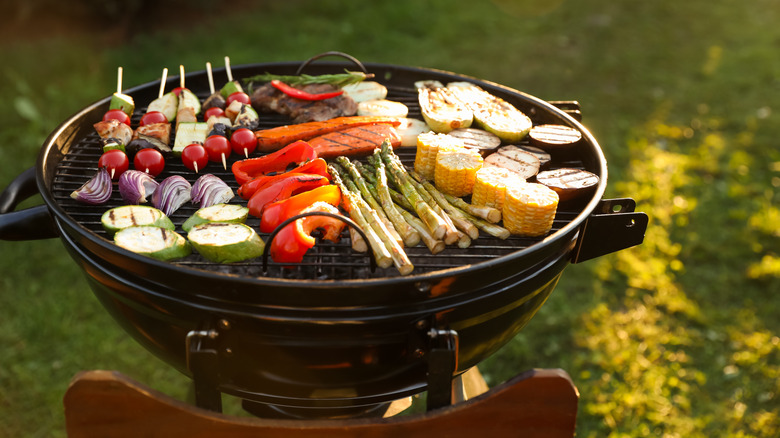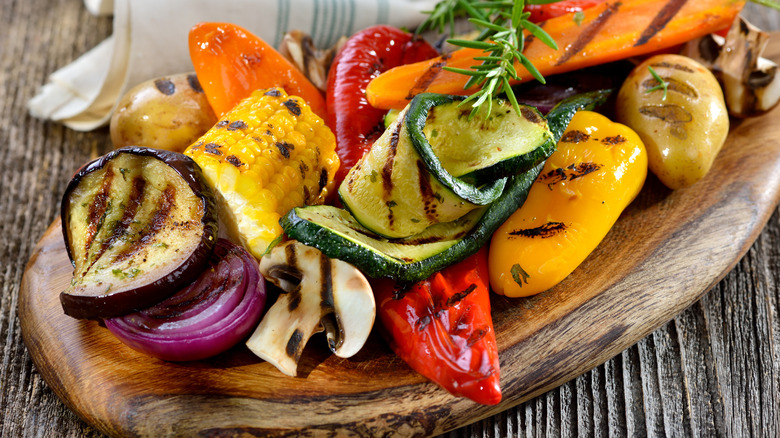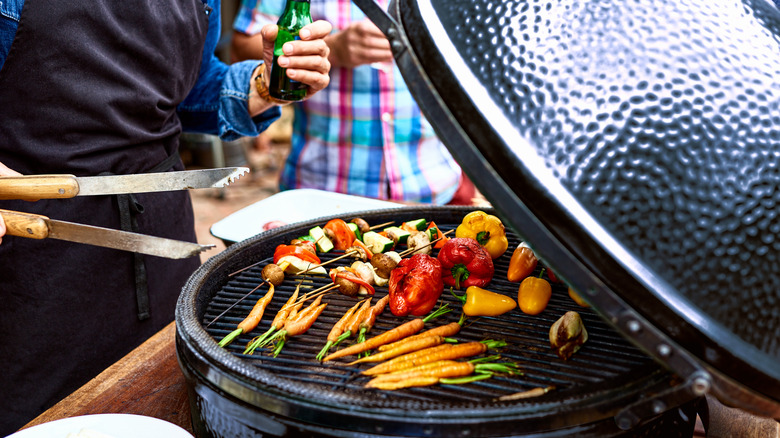The Best (And Worst) Veggies To Throw On The Grill
Are you firing up the grill and planning to include veggies? Good choice! Vegetables make a great addition to any barbecue, balancing heavier meats and starches with fresh tastes of the season. However, not all veggies are ideal when grilled, and to determine the best (and worst) options, Daily Meal turned to Silvio Correa, Brazilian grill master and private chef.
Correa hails from Brazil but eventually moved to Southern California, where he opened his own business, Silvio Personal Chef. His company's Instagram gives us a window into his passion for grilling, but to go deeper, Daily Meal sought out his expertise in the vegetable department. In an exclusive interview, he explained that when it comes to grilling, it's important to consider the water content of vegetables. He recommends portobello mushrooms, saying, "Their dense texture and natural juices make them ideal for grilling without drying out." Meanwhile, "vegetables with low water content, such as broccoli florets or cauliflower, can become too dry." However, these suggestions are the tip of the iceberg.
Choosing the best veggies for grilling (plus tips to get that perfectly smoky sear)
You can grill vegetables over gas or firewood, but if you go the classic route, there are some tips for grilling with charcoal you should know about. And remember, because grilling is a high-heat cooking method, you have to choose your vegetables wisely. You must consider how well the vegetable holds up to heat and how grilling will change its flavor and texture.
Don't want those vegetables to dry out? Silvio Correa suggests using zucchini or squash since they contain a lot of water. "Their high water content keeps them moist and tender during grilling," he said, also noting that bell peppers make an excellent choice because "their thick skin helps them hold up well to high heat, and they develop a sweet, smoky flavor." And if you want something that grills quickly and has a nice crunch, he recommends asparagus.
When veggies are grilled directly over high heat, their skin can develop a beautiful sear. But after you get that yummy texture, consider moving dense veggies further from the flame so they can cook thoroughly. The grilling process also kicks in a Maillard reaction, creating caramelization and enhancing flavor. This works particularly well on root veggies and carrots, which take on a sweeter, caramelized taste. However, if you want them crispy rather than mushy, there's an unexpected grilling tip to brown those veggies: hold the salt for later. Salting before cooking can result in a softer, mushier mouthfeel. By salting after grilling, you can get a more desirable texture and smoky sear.
What to avoid when grilling vegetables
Have you ever tried grilling leafy greens? If so, you probably know it doesn't work well, and Silvio Correa wouldn't recommend it. "Leafy greens like spinach, kale, or lettuce aren't ideal for grilling because they wilt and dry out quickly under high heat," he said. We're not sure how you'd even get them off the grill, as we imagine they'd slip in between grates as they soften. These leafy greens don't belong on your barbecue, so if you want crunchy, cooked greens, try baked kale chips instead.
Placing certain raw veggies like broccoli and cauliflower straight on the grill may dry them out. However, that doesn't mean you can't grill these cruciferous veggies; you just need to take extra measures to ensure the ideal texture. Correa says they should be "pre-steamed or cooked over indirect heat," which will help them cook more slowly and retain their juices. In the same vein, barbecued carrots can taste amazing, but unfortunately, it's easy to make mistakes when grilling carrots. Their density can lead to uneven cooking, with a charred exterior and raw center. If you want that tender, sweet flesh with a caramelized crunch, cook them first. The easiest way to do this is choosing long, slender carrots and popping them in the microwave before tossing them on the grill.
So, if you're using an outdoor grill, consider barbecuing instead. Not everyone knows the differences between barbecuing and grilling, but essentially, barbecuing is cooking low-and-slow rather than at a high heat. Just make sure you understand a vegetable's water content and density so you end up with the perfect side dish.


